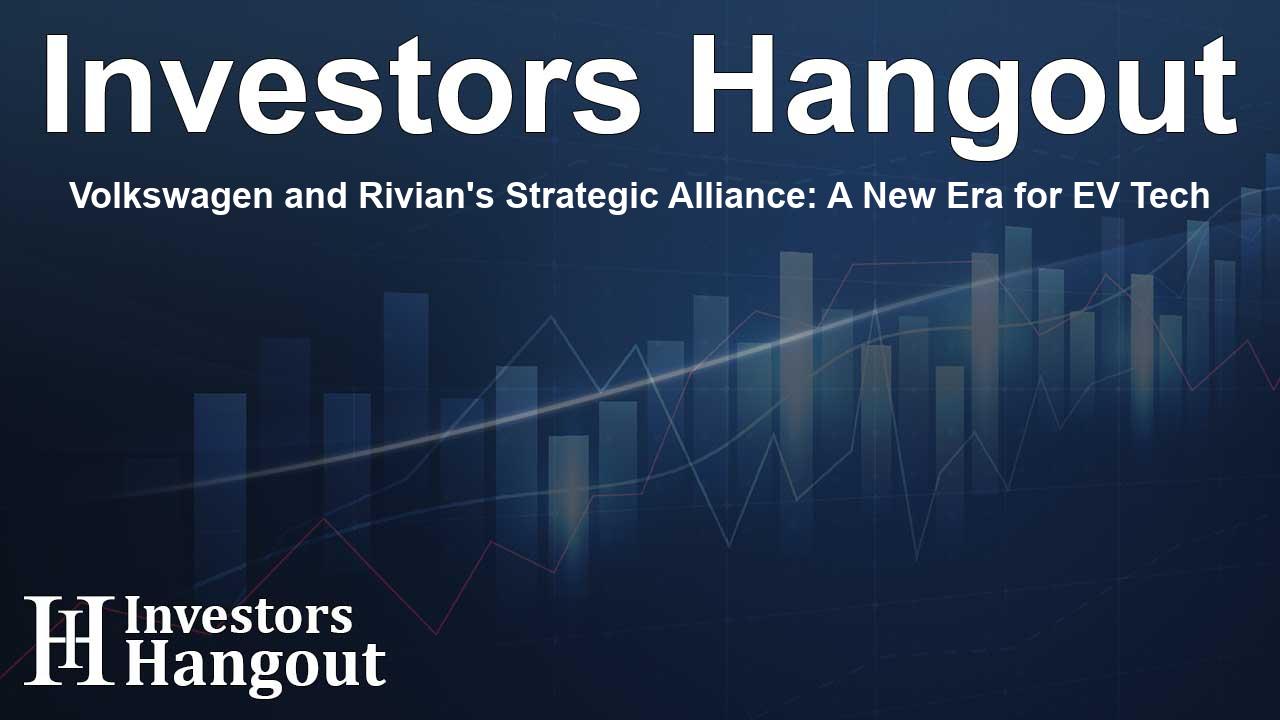Volkswagen and Rivian's Strategic Alliance: A New Era for EV Tech

Volkswagen and Rivian's Strategic Alliance: A New Era for EV Tech
Volkswagen (OTC: VLKAF) has announced a substantial increase in its investment in American electric vehicle maker Rivian (NASDAQ: RIVN), raising the total to $5.8 billion. This figure surpasses their initial commitment by $800 million. The partnership marks a significant step forward in both companies' ambitions to lead in the electric vehicle (EV) market.
The intent behind this collaboration was formally unveiled with the launch of the newly formed company, Rivian and VW Group Technology, LLC. This joint venture, celebrated on a recent date in November, aims to merge resources and expertise to accelerate EV technology development.
Volkswagen's CEO, Oliver Blume, emphasized the partnership's strategic importance, stating, "The collaboration with Rivian marks the next logical step in our software strategy." He conveyed the companies' vision to produce state-of-the-art EV solutions that are not only cost-competitive but also elevate the consumer experience through advanced technology. The initial announcement led to a brief increase in Rivian’s stock price, showcasing investors' optimism amid Rivian's journey.
Advantages of the Volkswagen-Rivian Collaboration
The partnership offers Volkswagen immediate access to Rivian’s cutting-edge software and electrical components. This strategic acquisition is essential for Volkswagen, especially given the external challenges posed by increasing competition in the EV market and shifts in consumer demand.
The deal’s inherent value lies in the combined expertise of both companies. For Rivian, the alliance represents a critical injection of capital, leveraging Volkswagen's expansive manufacturing capabilities to improve operational efficiency. Rivian's leaders acknowledge the immense potential this collaboration holds for introducing innovative technologies across the automotive landscape.
Joint Venture Structure and Financial Commitment
The joint venture is set with a significant commitment, including an initial outlay of $1 billion, with an additional $4.8 billion pledged through 2027. This financial plan is milestone-driven, ensuring that both companies' contributions align with operational and technological objectives.
A portion of the investments will directly support Rivian’s upcoming R2 model, expected to debut as an affordable compact SUV priced around $45,000. Additionally, Volkswagen plans to integrate Rivian's electrical systems into its existing vehicle range by 2027, enhancing models across its various brands.
Adapting to Market Dynamics and Internal Challenges
Current trends show that Rivian has faced significant challenges, including production delays and financial losses. Consumer Reports recently included Rivian in its list of questionable car brands due to reliability issues, despite their high-performance ratings. Rivian's management is focused on improving manufacturing processes to address its deficits while maintaining an optimistic outlook for profitability by late 2024.
Volkswagen's Position Amid Industry Changes
Volkswagen itself is navigating a complex automotive market, having seen a steep decline in its stock, dropping roughly 27% in value year-to-date. The company has started to close several domestic factories—a first in its history—as it responds to declining vehicle production rates in Germany.
Despite job cuts, Volkswagen has remained profitable by concentrating on luxury models, highlighting a shift in consumer preferences towards higher-margin segments. This has allowed the company to report substantial operating profits, even amid reduced production volumes.
Reactions from Executives and Industry Experts
The insights from industry professionals underline the benefits of the Volkswagen-Rivian partnership. Analysts view the collaboration as a pivotal moment for Rivian to leverage Volkswagen’s technology while helping Volkswagen access Rivian's innovative capacities. They emphasize that both parties stand to gain from this collaboration, especially as they navigate an evolving automotive landscape.
As both companies look forward to capitalizing on the synergy created by this partnership, they are also focused on addressing the challenges that currently face both firms. With internal restructures and market adaptations underway, the future remains uncertain yet promising for Volkswagen and Rivian.
Frequently Asked Questions
What is the nature of the partnership between Volkswagen and Rivian?
The partnership aims to combine Volkswagen's manufacturing strengths with Rivian's innovative software and technology in the electric vehicle sector.
How much has Volkswagen invested in Rivian?
Volkswagen has increased its total investment in Rivian to $5.8 billion, reflecting a boost from its initial commitment.
What are the goals of the Volkswagen and Rivian joint venture?
The venture's primary goals include developing software-defined vehicles and enhancing modular electrical architectures for better vehicle performance.
How does this partnership help Rivian?
Rivian gains crucial capital and manufacturing expertise from Volkswagen, allowing it to refine its production processes and improve operational efficiency.
What challenges is Volkswagen currently facing?
Volkswagen is contending with a significant decline in stock value, factory closures, and a shift in consumer demand towards electric vehicles amidst stiff competition.
About Investors Hangout
Investors Hangout is a leading online stock forum for financial discussion and learning, offering a wide range of free tools and resources. It draws in traders of all levels, who exchange market knowledge, investigate trading tactics, and keep an eye on industry developments in real time. Featuring financial articles, stock message boards, quotes, charts, company profiles, and live news updates. Through cooperative learning and a wealth of informational resources, it helps users from novices creating their first portfolios to experts honing their techniques. Join Investors Hangout today: https://investorshangout.com/
Disclaimer: The content of this article is solely for general informational purposes only; it does not represent legal, financial, or investment advice. Investors Hangout does not offer financial advice; the author is not a licensed financial advisor. Consult a qualified advisor before making any financial or investment decisions based on this article. The author's interpretation of publicly available data shapes the opinions presented here; as a result, they should not be taken as advice to purchase, sell, or hold any securities mentioned or any other investments. The author does not guarantee the accuracy, completeness, or timeliness of any material, providing it "as is." Information and market conditions may change; past performance is not indicative of future outcomes. If any of the material offered here is inaccurate, please contact us for corrections.